一般将来时讲解
一般将来时时态用法讲解

⼀般将来时时态⽤法讲解⼀般将来时时态1. ⼀般将来时的定义⼀般将来时表⽰在现在看来即将要发⽣的动作或存在的状态。
常⽤时间副词tomorrow, soon或短语next year / week / month, in a few days, in the future, sometime 做状语。
如:What will you do this afternoon?你今天下午⼲什么?We will have a meeting tomorrow. 我们明天要开会。
He is going to study abroad(到国外) next year. 明年他要出国学习。
2. ⼀般将来时的结构及应⽤(1) shall / will + 动词原形。
表⽰即将发⽣的动作或存在的状态。
特别是表⽰客观性的事情或在某条件下要发⽣的事情,只能⽤此结构。
如:What shall we do if he doesn’t come 如果他不来,我们该怎么办?Will you be free this evening 今天晚上有空吗?I think he will tell us the truth(真相)。
我想他会告诉我们真实情况的。
(2) be going to + 动词原形。
表⽰已经计划或安排好了的事情,也可表⽰有迹象表明肯定要发⽣的事情。
如:We are going to have a meeting to discuss (讨论)the matter this evening. 今天晚上开会讨论这件事情。
Look at the black clouds over there. I think it is going to rain soon. 看⼀看那边的乌云,我想天要下⾬了。
There is going to be an English evening this week. 本周要举⾏⼀个英语晚会。
(3) be +现在分词。
初二英语语法分析--一般将来时用法讲解
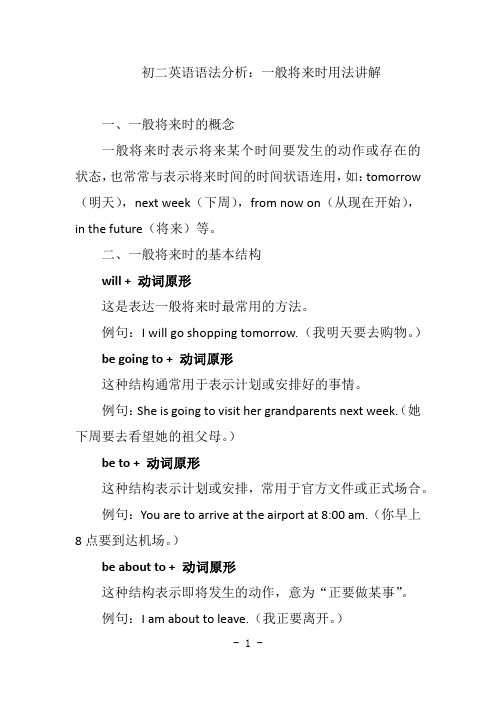
初二英语语法分析:一般将来时用法讲解一、一般将来时的概念一般将来时表示将来某个时间要发生的动作或存在的状态,也常常与表示将来时间的时间状语连用,如:tomorrow (明天),next week(下周),from now on(从现在开始),in the future(将来)等。
二、一般将来时的基本结构will + 动词原形这是表达一般将来时最常用的方法。
例句:I will go shopping tomorrow.(我明天要去购物。
)be going to + 动词原形这种结构通常用于表示计划或安排好的事情。
例句:She is going to visit her grandparents next week.(她下周要去看望她的祖父母。
)be to + 动词原形这种结构表示计划或安排,常用于官方文件或正式场合。
例句:You are to arrive at the airport at 8:00 am.(你早上8点要到达机场。
)be about to + 动词原形这种结构表示即将发生的动作,意为“正要做某事”。
例句:I am about to leave.(我正要离开。
)be due to + 动词原形这种结构表示某事预定或预期将要发生。
例句:The train is due to arrive at 5:00 pm.(火车预定下午5点到达。
)三、一般将来时的用法1表示将来的动作或状态例句:I will buy a new car next year.(明年我要买一辆新车。
)2表示将来的计划或安排例句:We are going to have a picnic this weekend.(我们这个周末要去野餐。
)3表示根据现有情况推测未来的可能性例句:It's going to rain soon.(很快就要下雨了。
)4表示命令、请求、建议等例句:You are to finish your homework before you go out.(你出去之前要把作业做完。
一般将来时讲解

一般将来时讲解一、概念:一般将来时表示将来某一时间的动作或状态,或将来某一段时间内经常的动作或状态。
常常和表示将来的时间状语连用。
如:tomorrow(明天),next week(下周);in the future(将来)等。
一般将来时由助动词shall(第一人称),will(第二、三人称)动词原形构成。
美国英语则不管什么人称,一律用will。
一般将来时基本句型肯定句:I / We shall / will go. You / He / She / They will go.否定句:I / We shall / will not go. You / He / She / They will not go.疑问句:Shall I / we go? Will you / he / she /t hey go?简略回答:Yes, 主语+ shall / will . / No, 主语+ shall / will not .特殊疑问句:一般将来时的特殊疑问句是将疑问词放在句首,后接一般疑问句(就主语提问时,以疑问词who开头的疑问词除外)--- Why will you be here on Sunday? ---I will have a meeting on Sunday.二、一般将来时结构1、will / shall + 动词原形这种结构一般单纯地表示将来某个时间将要发生的动作或存在的状态。
will用于各种人称; shall只用于第一人称。
例如:I will / shall go to visit him next week. 下周我将去拜访他。
What time shall we go there tomorrow? 明天我们几点去那儿?2、be going to 动词原形be going to 相当于一个助动词(其中be有人称和数的变化),与它后面的动词原形一起构成谓语。
用来表示近期将要发生的动作或存在的状态,以及计划、安排、打算要做的事。
(完整word)一般将来时讲解
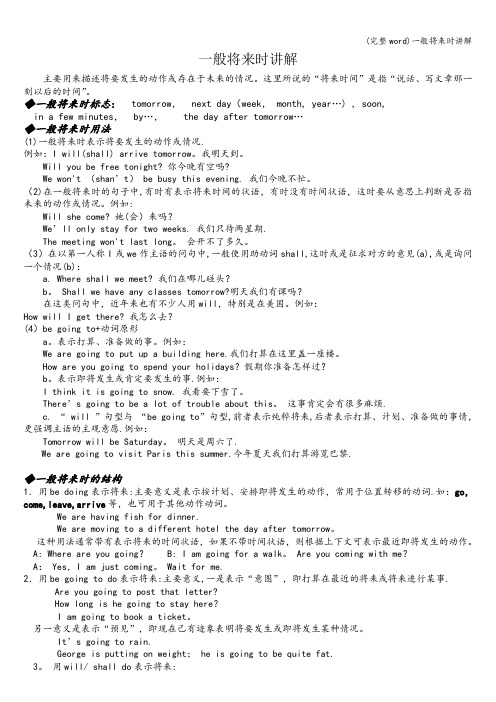
一般将来时讲解主要用来描述将要发生的动作或存在于未来的情况。
这里所说的“将来时间”是指“说话、写文章那一刻以后的时间”。
◆一般将来时标志: tomorrow, next day(week,month, year…) , soon,in a few minutes,by…, the day after tomorrow…◆一般将来时用法(1)一般将来时表示将要发生的动作或情况.例如:I will(shall) arrive tomorrow。
我明天到。
Will you be free tonight? 你今晚有空吗?We won't (shan’t) be busy this evening. 我们今晚不忙。
(2)在一般将来时的句子中,有时有表示将来时间的状语,有时没有时间状语,这时要从意思上判断是否指未来的动作或情况。
例如:Will she come? 她(会)来吗?We’ll only stay for two weeks. 我们只待两星期.The meeting won't last long。
会开不了多久。
(3)在以第一人称I或we作主语的问句中,一般使用助动词shall,这时或是征求对方的意见(a),或是询问一个情况(b):a. Where shall we meet? 我们在哪儿碰头?b。
Shall we have any classes tomorrow?明天我们有课吗?在这类问句中,近年来也有不少人用will,特别是在美国。
例如:How will I get there? 我怎么去?(4)be going to+动词原形a。
表示打算、准备做的事。
例如:We are going to put up a building here.我们打算在这里盖一座楼。
How are you going to spend your holidays?假期你准备怎样过?b。
表示即将发生或肯定要发生的事.例如:I think it is going to snow. 我看要下雪了。
一般将来时态讲解
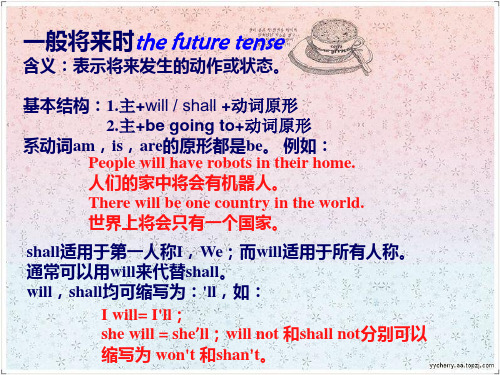
will
说话人认为、相信、希望或假定要发生 的事,不含任何具体的时间,可以指遥 远的未来。 I believe China will become one of the richest countries in the world.
be going to
有迹象表明某事即将发生或肯定会发生, 通常表示很快就要发生的事情。 There is going to be a quarrel between them, I think.
• • • • • • •
Is there a film tonight? 今晚有电影吗? I write my paper tomorrow. Tomorrow is Christmas Day. When does the ship sail? She retires next month. How long does he stay? The plane takes off at eight and arrives in Beijing at eleven.
1.一般将来时的用法
• ①表示将来某一时间将要发生的动作或 存在的状态, I shall be free this afternoon. • There'll be no chemistry classes tomorrow. • They will probably go to Shanghai for their holiday. • 注意:在口语中,常用will / shall + be doing结构来代替will / shall + 动词原形, 以表示生动。 • I‘ll be seeing a friend off at the airport. • He'll be going with us tomorrow.
一般将来时语法知识讲解
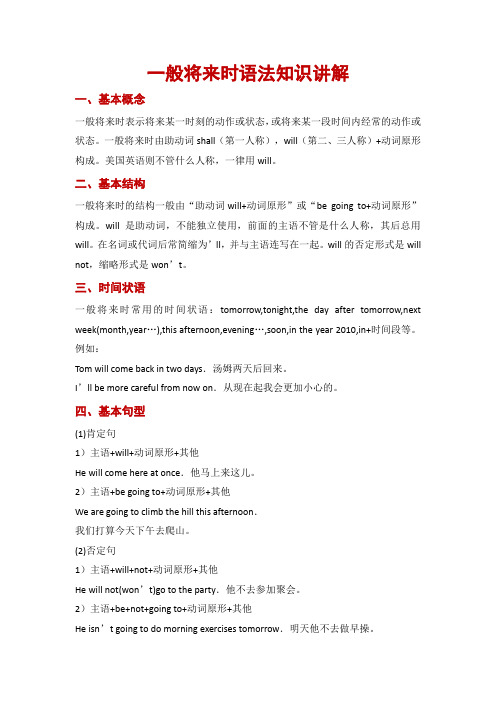
一般将来时语法知识讲解一、基本概念一般将来时表示将来某一时刻的动作或状态,或将来某一段时间内经常的动作或状态。
一般将来时由助动词shall(第一人称),will(第二、三人称)+动词原形构成。
美国英语则不管什么人称,一律用will。
二、基本结构一般将来时的结构一般由“助动词will+动词原形”或“be going to+动词原形”构成。
will是助动词,不能独立使用,前面的主语不管是什么人称,其后总用will。
在名词或代词后常简缩为’ll,并与主语连写在一起。
will的否定形式是will not,缩略形式是won’t。
三、时间状语一般将来时常用的时间状语:tomorrow,tonight,the day after tomorrow,next week(month,year…),this afternoon,evening…,soon,in the year 2010,in+时间段等。
例如:Tom will come back in two days.汤姆两天后回来。
I’ll be more careful from now on.从现在起我会更加小心的。
四、基本句型(1)肯定句1)主语+will+动词原形+其他He will come here at once.他马上来这儿。
2)主语+be going to+动词原形+其他We are going to climb the hill this afternoon.我们打算今天下午去爬山。
(2)否定句1)主语+will+not+动词原形+其他He will not(won’t)go to the party.他不去参加聚会。
2)主语+be+not+going to+动词原形+其他He isn’t going to do morning exercises tomorrow.明天他不去做早操。
(3)一般疑问句1)Will+主语+动词原形+其他?Will he help you with your English?他会帮助你学习英语吗?2)Be动词(Am,Is,Are)+主语+going to+动词原形+其他?Are you going to play computer games tomorrow afternoon?你打算明天下午玩电脑游戏吗?(4)特殊疑问句:疑问词+一般疑问句?—What will the students have for lunch today?学生们今天午饭吃什么?—They will have bread.他们将吃面包。
一般将来时
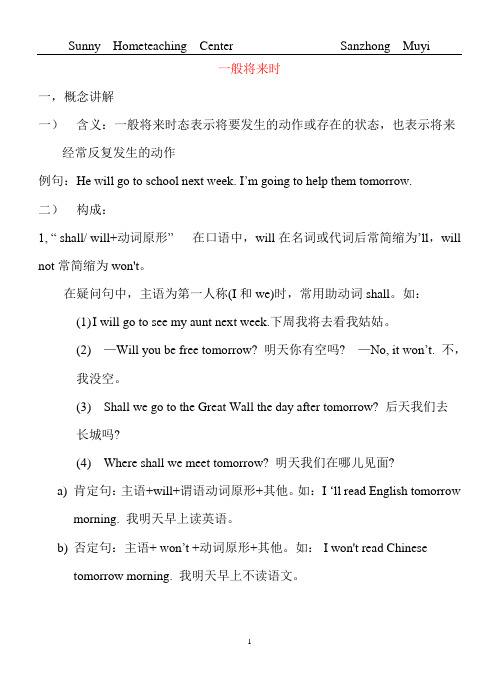
一般将来时一,概念讲解一)含义:一般将来时态表示将要发生的动作或存在的状态,也表示将来经常反复发生的动作例句:He will go to school next week. I‟m going to help them tomorrow.二)构成:1, “ shall/ will+动词原形” 在口语中,will在名词或代词后常简缩为‟ll,will not常简缩为won't。
在疑问句中,主语为第一人称(I和we)时,常用助动词shall。
如:(1)I will go to see my aunt next week.下周我将去看我姑姑。
(2) —Will you be free tomorrow? 明天你有空吗? —No, it won‟t. 不,我没空。
(3) Shall we go to the Great Wall the day after tomorrow? 后天我们去长城吗?(4) Where shall we meet tomorrow? 明天我们在哪儿见面?a)肯定句:主语+will+谓语动词原形+其他。
如:I …ll read English tomorrowmorning. 我明天早上读英语。
b)否定句:主语+ won‟t +动词原形+其他。
如: I won't read Chinesetomorrow morning. 我明天早上不读语文。
c)一般疑问句:助动词will+ 主语+ 动词原形+ 其他+? 如: will you readEnglish tomorrow morning ? Yes, I will./No, I won‟t . 你明天早上读英语吗?是的,我明天早上读英语。
/不是的,我明天早上不读英语。
d)特殊疑问句:特殊疑问词+一般疑问句+? 如:What will you dotomorrow morning ? 你明天早上做什么?2, “be going to + 动词原形”be going to常用来表示打算、计划、决定要做的事情或根据某些现象或征兆预测即将发生的事。
英语一般将来时讲解

一般将来时一、一般将来时定义:一般将来时表示将来某一时刻,或将来某一段时间内的动作或状态。
二、一般将来时两个招牌单词will/shall,shall用于第一人称单数,如:shall I…,I shallshall we 。
we shall will则通用三、基本结构will/shall + V原四、缩略形式will 常简略为'll,并与主语连写在一起,如:I'll,he'll,it'll,we'll,you'll,they'll。
例句:Will you be free tonight? 你今晚有空吗?We won’t(shan’t) be busy this evening. 我们今晚不忙。
He’ll go to London next weekWe’ll only stay for two weeks. 我们只待两星期。
We’ll go to the Great Wall if it is fine tomorrow.We shall have a delicious dinner tonight. 今晚我们将美餐一顿。
Shall we go to the park ,tonight ??Tomorrow will be Sunday. 明天就是星期天。
The rain will stop soon. 雨很快就要停了。
Shall we go there at five? 我们五点钟去那儿,好吗?Will you please open the door? 请你把门打开,好吗?五、用法基本用法:“助动词will或shall+动词原形”这一形式,表示将来发生的事情,用于征求对方的意见或表示客气的邀请。
在口语中will用于所有人称,书面语中第一人称常用shall。
如:I can see you're busy, so I won't stay long.我看得出你很忙,所以我不会呆太久。
一般将来时讲解(附习题+答案)

一般将来时讲解(附习题+答案)一、一般将来时的含义:表示动作发生在将来二、一般将来时的句型:(1) will/shall+动词原形(2) be going to+动词原形三、一般将来时的时间状语:tomorrow(明天)、the day after tomorrow(后天)、next...(下一...): next week(下一周)、next year(明年)、next month(下个月)in+一段时间(...之后): in three days(三天之后)、in the future在未来this evening(今天晚上)四、一般将来时的句型结构:(1) will/shall+动词原形(will not =won’t)(will 各种人称均可用,shall 只能用于第一人称)1)肯定句:主语+will/shall+动词原型...如:I will go to school tomorrow.我明天将会去学校He will go to school tomorrow.他明天将会去学校。
2)否定句:主语+will/shall+not+动词原型...如:I won’t go to school tomorrow.我明天将不会去学校。
He won’t go to school tomorrow.他明天将不会去学校。
3)一般疑问句:Will/Shall +主语+动词原型...如:Will you go to school tomorrow?你明天要去学校吗?Will he go to school tomorrow?他明天要去学校吗?肯定回答:Yes, 主语+will.如:Yes, I will.Yes, he will.否定回答:No,主语+will+not.如:No, I won’t.No, he won’t.4) 特殊疑问句:特殊疑问词+will/shall+主语+动词原型...如:What will you do tomorrow?你明天将会做什么?What will he do tomorrow?他明天将会做什么?(2) be going to+动词原形1)肯定句:主语+be going to +动词原型...如:I am going to buy some books tomorrow.我明天打算去买一些书。
初中英语一般将来时详细讲解

初中英语一般将来时详细讲解初中英语一般将来时(Simple Future Tense)用于表示将来某个时间会发生的动作或存在的状态。
下面是初中英语一般将来时的详细讲解:一、构成:1.一般将来时的肯定句结构为:主语 + will + 动词原形2.一般将来时的否定句结构为:主语 + will not (won't) + 动词原形3.一般将来时的疑问句结构为:Will + 主语 + 动词原形?二、用法:1. 表示未来的事实、计划或打算:①I will visit my grandparents next week.(我下周会去看望我的祖父母。
)②We will have a party on Saturday.(我们周六要开个派对。
)2. 表示预测或推测:①It will rain tomorrow.(明天会下雨。
)②He will probably be late for the meeting.(他可能会迟到会议。
)3. 表示意愿、请求、建议等:①Will you please help me with my homework?(你能帮我做作业吗?)②I will do my best to help you.(我会尽力帮助你。
)4. 表示承诺或威胁:①I will always love you.(我会永远爱你。
)②If you don't listen to me, I will tell the teacher.(如果你不听我的话,我会告诉老师。
)注意事项:1. 在一般将来时中,主语通常是第一人称(I/we)或第三人称(he/she/it/they),而第二人称(you)在肯定句和否定句中都是一样的。
2. 一般将来时的疑问句需要将助动词will放在句首。
3. 在一般将来时中,表示将来时间的副词或时间状语可以与will连用,如tomorrow, next week等。
三、总结:初中英语一般将来时用于表示未来某个时间会发生的动作或存在的状态,可以用于表达事实、计划、预测、意愿、请求等。
初中英语一般将来时态讲解
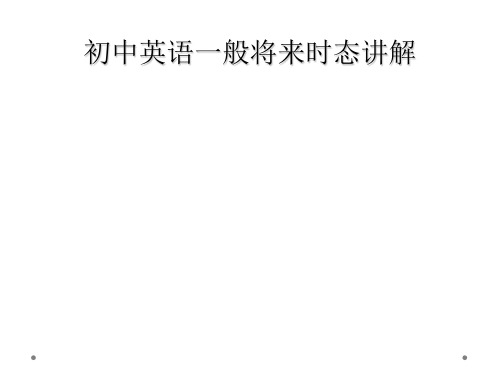
2、否定式
I shall not go to Europe next week. 下周我将不会去欧洲。 Lisa won’t be back in a few days. 丽莎几天后还不会回来。
3、一般疑问式
A: Will you go to Europe next week B: Yes, I will. B: No, I won’t. A: Will Lisa be back in a few days B: Yes, she will. B: No, she won’t.
不久后 before long a moment later
将来 in the future 明天早上 tomorrow morning
一小时后 one hour later in an hour
• be going to+动词原形
1、表示现在的意图,即打算在最近或 不久的将来做某事。
We are going to ask him. 我们打算问他。 What are you going to do tonight 你今晚打算做什么?
表示将要发生的动作或情况。如:
明天将会下雨。
It will rain tomorrow.
他将在下周一到达。
He will arrive next Monday.
我将永远不会忘记它。
I shall never forget it.
下次 next time 明天 tomorrow 明年 next year 今天下午 this afternoon 后天 the day after tomorrow
2、表示现在已有迹象表明即将 发生某事。
Look, it’s going to rain.
一般将来时的结构和用法及讲解
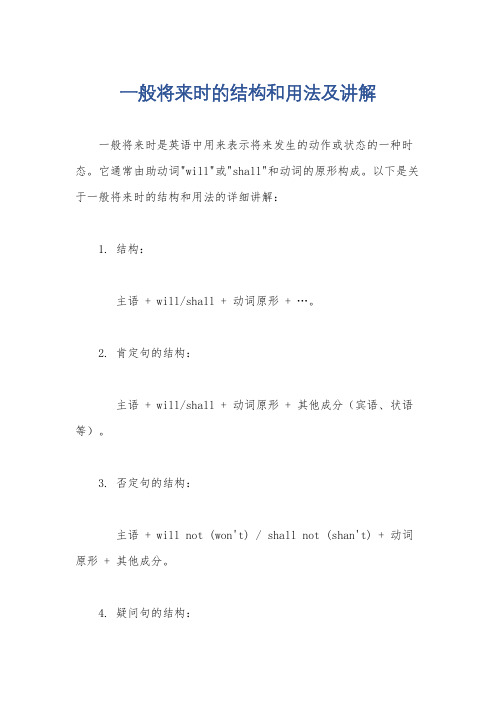
一般将来时的结构和用法及讲解一般将来时是英语中用来表示将来发生的动作或状态的一种时态。
它通常由助动词"will"或"shall"和动词的原形构成。
以下是关于一般将来时的结构和用法的详细讲解:1. 结构:主语 + will/shall + 动词原形+ …。
2. 肯定句的结构:主语 + will/shall + 动词原形 + 其他成分(宾语、状语等)。
3. 否定句的结构:主语 + will not (won't) / shall not (shan't) + 动词原形 + 其他成分。
4. 疑问句的结构:Will/Shall + 主语 + 动词原形 + 其他成分?5. 用法:a. 表示未来的事实、计划或意图,例如,“I will call you later.”(我稍后会给你打电话。
)。
b. 表示预测或假设,例如,“It will rain tomorrow.”(明天会下雨。
)。
c. 表示意愿、请求或承诺,例如,“I will help you with your homework.”(我会帮你做作业。
)。
d. 表示决定,例如,“I will buy a new car.”(我决定买辆新车。
)。
一般将来时的用法相对灵活,可以根据语境和需要进行灵活运用。
需要注意的是,一般将来时中的助动词"will"在口语中常缩写为"‘ll",而否定形式则缩写为"won't"。
同时,在一般将来时中,shall通常用于第一人称(I 和 we),而will则用于其他人称。
在现代英语中,shall的使用已经相对较少,通常用will来表示一般将来时。
一般将来时提问句型知识点讲解

一般将来时提问句型知识点讲解一般将来时是英语中表示将来发生或将要发生的动作或状态的时态。
在构成提问句时,需要利用助动词和主语的位置来完成句子结构。
以下将针对一般将来时提问句型的知识点进行详细讲解。
1. 一般将来时的构成一般将来时的构成方式是:助动词“will”或“shall” + 动词原形。
例如:I will go to the park tomorrow.(我明天会去公园。
)2. 提问句型一:一般将来时的一般疑问句在构成一般将来时的一般疑问句时,需要将助动词“will”置于主语之前。
肯定回答时使用“Yes, 主语+ will.”的结构,否定回答则使用“No, 主语+ will not.”。
例如:Will you come to the party tomorrow?(你明天会来参加派对吗?)3. 提问句型二:一般将来时的特殊疑问句一般将来时的特殊疑问句是通过特殊疑问词来引导疑问内容的构成。
特殊疑问词置于句首,然后依然遵循助动词“will”+ 主语 + 动词原形的结构。
例如:When will you finish your homework?(你什么时候会完成作业?)4. 提问句型三:一般将来时的选择疑问句选择疑问句是一种结合两种句子形式的疑问句,用于提出两种或几种可能性,询问对方的选择。
构成方式是助动词“will”置于第一个句子主语之前,第二个句子主语+ will + 动词原形。
例如:Will she go shopping or watch a movie tonight?(她今晚是去购物还是看电影?)5. 小结通过以上讲解,我们可以清晰地了解一般将来时提问句型的知识点。
在日常学习和交流中,灵活运用这些句型可以更准确地表达自己的意图,也有助于提高英语口语的流利程度。
希望以上内容对大家有所帮助,提高英语学习效率。
英语一般将来时讲解
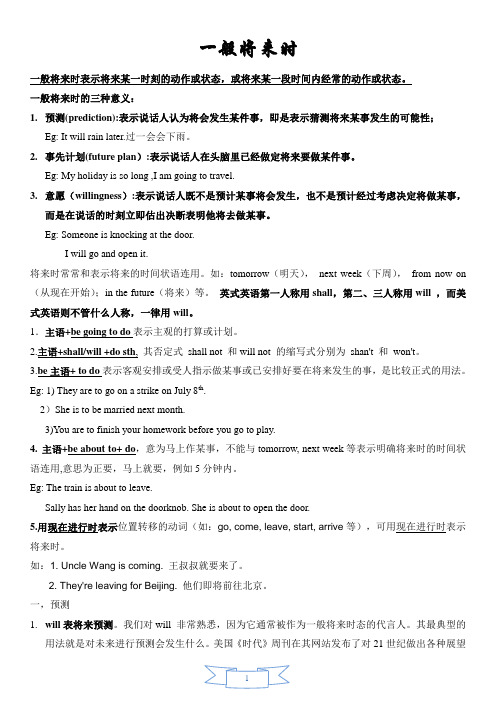
一般将来时一般将来时表示将来某一时刻的动作或状态,或将来某一段时间内经常的动作或状态。
一般将来时的三种意义:1.预测(prediction):表示说话人认为将会发生某件事,即是表示猜测将来某事发生的可能性;Eg: It will rain later.过一会会下雨。
2.事先计划(future plan):表示说话人在头脑里已经做定将来要做某件事。
Eg: My holiday is so long ,I am going to travel.3.意愿(willingness):表示说话人既不是预计某事将会发生,也不是预计经过考虑决定将做某事,而是在说话的时刻立即估出决断表明他将去做某事。
Eg: Someone is knocking at the door.I will go and open it.将来时常常和表示将来的时间状语连用。
如:tomorrow(明天),next week(下周),from now on (从现在开始);in the future(将来)等。
英式英语第一人称用shall,第二、三人称用will ,而美式英语则不管什么人称,一律用will。
1.主语+be going to do表示主观的打算或计划。
2.主语+shall/will +do sth, 其否定式shall not 和will not 的缩写式分别为shan't 和won't。
3.be主语+ to do表示客观安排或受人指示做某事或已安排好要在将来发生的事,是比较正式的用法。
Eg: 1) They are to go on a strike on July 8th.2)She is to be married next month.3)You are to finish your homework before you go to play.4.主语+be about to+ do,意为马上作某事,不能与tomorrow, next week等表示明确将来时的时间状语连用,意思为正要,马上就要,例如5分钟内。
英语语法一般将来时的讲解
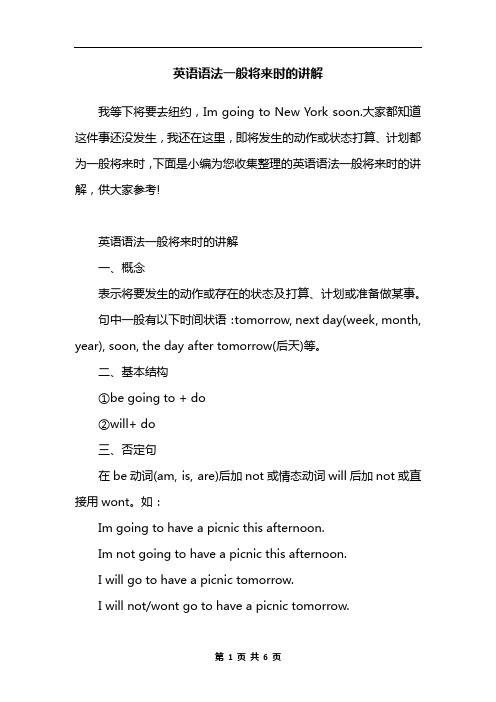
英语语法一般将来时的讲解我等下将要去纽约,Im going to New York soon.大家都知道这件事还没发生,我还在这里,即将发生的动作或状态打算、计划都为一般将来时,下面是小编为您收集整理的英语语法一般将来时的讲解,供大家参考!英语语法一般将来时的讲解一、概念表示将要发生的动作或存在的状态及打算、计划或准备做某事。
句中一般有以下时间状语:tomorrow, next day(week, month, year), soon, the day after tomorrow(后天)等。
二、基本结构①be going to + do②will+ do三、否定句在be动词(am, is, are)后加not或情态动词will后加not或直接用wont。
如:Im going to have a picnic this afternoon.Im not going to have a picnic this afternoon.I will go to have a picnic tomorrow.I will not/wont go to have a picnic tomorrow.四、一般疑问句be或will提到句首,some改为any, and改为or,第一二人称互换。
如:We are going to go on an outing this weekend.Are you going to go on an outing this weekend?五、对划线部分提问。
一般情况下,一般将来时的对划线部分有三种情况。
1. 问人。
Who 如:Im going to New York soon.Whos going to New York soon?2. 问干什么。
What 如:My father is going to watch a race with me this afternoon.What is your father going to do with you this afternoon?3. 问什么时候。
(完整word版)一般将来时态讲解及练习和答案

1、概述一般将来时表示将来某个时间要发生的动作或存在的状态,常与表示将来的时间状语连用,如tomorrow,next week,next year等。
Why don’t you put the meat in the fridge? It will stay fresh for several days.为什么不把肉放在冰箱里?它可以保鲜好几天。
—You’ve left the light on。
你忘了关灯了。
- Oh , so I have。
I'll go and turn it off。
噢,那我马上去关.2、构成一般将来时由“助动词will/shall+动词原形”构成。
will用于第二、三人称,shall第一人称。
在口语中,will在名词或代词后常缩写为’ll,will not简缩为won’t[wount]。
但在美国英语中,各种人称皆可用will。
He will help his sister with her lessons。
他将帮助他妹妹做功课.We won’t be free this afternoon.今天下午我们没空。
3、一般将来时的用法(1)表示未来的动作或存在状态,常与表示将来的时间状语连用,如tomorrow, next Sunday, soon,in a month, in the future等。
We shall leave for London next Monday.我们将在下周一去伦敦。
He will come to see you the day after tomorrow.后天他要来看你。
You will be 20 next year。
明年你就二十了。
(2)表示将来反复发生的动作或习惯性动作We shall come and work in this factory every year.我们将每年来这工厂参加劳动。
The students will have five English classes per week this term.本学期学生每周将要上五节英语课。
初中英语语法——一般将来时详细讲解
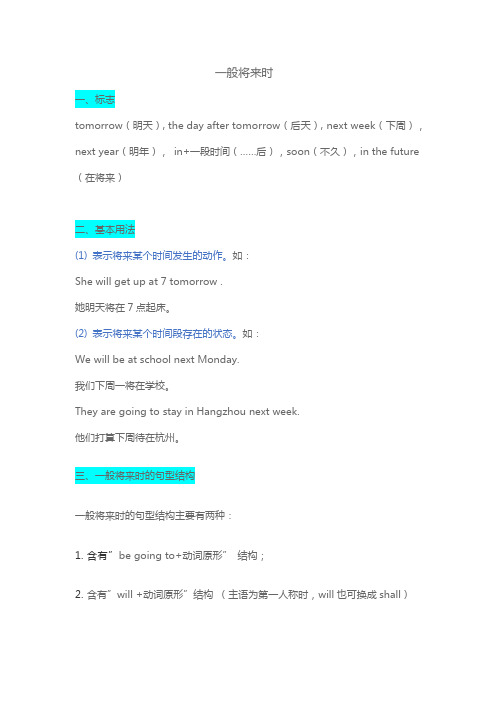
一般将来时一、标志tomorrow(明天), the day after tomorrow(后天), next week(下周),next year(明年),in+一段时间(……后),soon(不久),in the future (在将来)二、基本用法(1) 表示将来某个时间发生的动作。
如:She will get up at 7 tomorrow .她明天将在7点起床。
(2) 表示将来某个时间段存在的状态。
如:We will be at school next Monday.我们下周一将在学校。
They are going to stay in Hangzhou next week.他们打算下周待在杭州。
三、一般将来时的句型结构一般将来时的句型结构主要有两种:1.含有”be going to+动词原形”结构;2.含有”will +动词原形”结构(主语为第一人称时,will也可换成shall)(1)肯定句:She is going to buy some vegetables tomorrow morning . 她打算明天上午买一些蔬菜。
(2)否定句:在be动词后加not。
is和are可以和not缩写为isn't,aren't。
She isn’t going to buy any vegetables tomorrow morning . 她明天上午不去买蔬菜。
(3)一般疑问句及其答语:将be动词放在句子开头,且首字母要大写,句末用问号。
肯定回答:Yes,主语的相应代词+am/is/are.否定回答:No,主语的相应代词+am not /isn't/aren't.—Is she going to buy any vegetables tomorrow morning?她打算明天上午去买一些蔬菜吗?—Yes,she is./No,she isn't. 是的,她打算去。
- 1、下载文档前请自行甄别文档内容的完整性,平台不提供额外的编辑、内容补充、找答案等附加服务。
- 2、"仅部分预览"的文档,不可在线预览部分如存在完整性等问题,可反馈申请退款(可完整预览的文档不适用该条件!)。
- 3、如文档侵犯您的权益,请联系客服反馈,我们会尽快为您处理(人工客服工作时间:9:00-18:30)。
一般将来时一般将来时表示将来某个时间要发生的动作,事情或存在的状态,也表示将来经常或反复发生的动作或事情1)will/shall+动词原形shall用于第一人称,常被will 所代替。
will 在陈述句中用于各人称,在征求意见时常用于第二人称。
will not=won't shall not=shan't 例如:Which paragraph shall I read first?我先读哪一段呢?Will you be at home at seven this evening? 今晚七点回家好吗?2)be going to +不定式,表示将来。
a. 主语的意图,即将做某事。
例如:What are you going to do tomorrow? 明天打算作什么呢?b. 计划,安排要发生的事。
例如:The play is going to be produced next month。
这出戏下月开播。
c. 有迹象要发生的事。
例如:Look at the dark clouds, there is going to be a storm. 看那乌云,快要下雨了。
3)be +不定式表将来,按计划或正式安排将发生的事。
例如:We are to discuss the report next Saturday.我们下星期六讨论这份报告。
4)be about to +不定式,意为马上做某事。
例如:He is about to leave for Beijing. 他马上要去北京。
注意:be about to do 不能与tomorrow, next week 等表示明确将来时的时间状语连用。
Notice:be to和be going tobe to 表示客观安排或受人指示而做某事,be going to 表示主观的打算或计划。
例如:I am to play football tomorrow afternoon. 明天下午我去踢球。
(客观安排)I'm going to play football tomorrow afternoon. 明天下午我想去踢球。
(主观安排)5).现在进行时表将来时下列动词的现在进行时表示将来时e.fly.leave.start.begin.finish.end.arrive and so on.she is leaving for Wuhan tomorrow.6).一般现在时表将来1)下列动词come, go, arrive, leave, start, begin, return的一般现在时可以表示将来,主要用来表示在时间上已确定或安排好的事情。
例如:The train leaves at six tomorrow morning. 火车明天上午六点开。
When does the bus star? It stars in ten minutes. 汽车什么时候开?十分钟后。
2)以here, there等开始的倒装句,表示动作正在进行。
例如:Here comes the bus. = The bus is coming. 车来了。
There goes the bell. = The bell is ringing. 铃响了。
3)在时间或条件句中。
例如:When Bill comes (不是will come), ask him to wait for me. 比尔来后,让他等我。
I'll write to you as soon as I arrive there. 我到了那里,就写信给你。
4)在动词hope, take care that, make sure that等的宾语从句中。
例如:I hope they have a nice time next week. 我希望他们下星期玩得开心。
Make sure that the windows are closed before you leave the room. 离开房间前,务必把窗户关了。
其时间状语有如下几种1)this引导的短语如this year 2)tomorrow及其相关短语如tomorrow morning 3)next引导的短语如next month 4) from now on ; in the future ; in an hour 等。
1)shall用于第一人称,可被will 所代替。
will 在陈述句中用于各人称,在争求意见时常用于第二人称。
Which paragraph shall I read first.Will you be at home at seven this evening?2)be going to +不定式,表示将来。
a. 主语的意图,即将做某事。
What are you going to do tomorrow?b. 计划,安排要发生的事。
The play is going to be produced next month。
c. 有迹象要发生的事Look at the dark clouds, there is going to be a storm.3)be +不定式表将来,按计划或正式安排将发生的事。
We are to discuss the report next Saturday.4)be about to +不定式,意为马上做某事。
He is about to leave for Beijing.注意:be about to 不能与tomorrow, next week 等表示明确将来时的时间状语连用。
注意:一、易忽视动词用原形形式例:1 He will is (be) at school next Monday.2 He is going to does (do) his homework after school.答案:1 be 2 do解析:第一题有的同学一看he做主语就用了is,忽视了will后应加动词原形。
我们在写句子时,很容易把动词丢掉,“英语句子里,动词不能少”的规律必须要牢记。
第二题中to后加动词原形,而不是用单三人称.二、be going to +动词原形与will+动词原形用法不清楚例:我正努力学习,准备参加英语考试。
I am studying hard and I will try for my English exams.答案:I am studying hard and I am going to try for my English exams.解析:“be going to”表示计划、打算要做某事。
E.g. He is going to visit his friends. 还表示某种迹象表明会发生某事.e.g. Look at the clouds. It’s going to rain. 而“Will+动词原形”指对将来事物的预见、表示意愿、决心。
E.g. I will wait for you until you come. 在单纯预测未来时,二者可以互换,但在此题中只能用be going to,而不能用will。
一.单项选择()1. He _______ able to come on Friday because he fails in his exam.A. will be notB. will not beC. is going to beD. isn’t going be()2. – When ________ again?--When he ____________, I’ll let you know.A. he comes ;comesB. will he come;will comeC. he comes ;will he comeD. will he come;comes()3. Do you think Tom ______________ his uncle if he arrives?A. calledB. callsC. will callD. is calling()7. We ________ begin our lessons if you _________ ready.A. will ; will beB. shall ; Will getC. will ; getD. /; are()9. Your shirt is dirty.________ it for you?A. Am I going to washB. Will I washC. Am I washingD. Shall I wash ()10. Look at these clouds, it _______________. A. will be raining B. is going to rain C. rains D. is to rain()11. It ______ hours to do the job. No, it won’t.A. has takenB. is takingC. will takeD. would take()12. If you don’t mind, I __________ off the TV set.A. will turnB. am turningC. would turnD. had turned()14. Shall I call a taxi for you?No, thanks. __________ one myselfA. I callB. I’ll callC. I’d callD. I called() 16. She ________ him a lovely dog on his next birthday.A. givesB. gaveC. will givingD. is going to give() 18. He ________ in four days.A. coming backB. came backC. will come backD. is going to coming back() 19. If it ________ tomorrow, we’ll have a picnic.A. isn’t rainB. won’t rainC. do esn’t rainD. doesn’t fine() 20. – Will his parents go to see the film tomorrow?No, ________.A. they shall not.B. they won’tC. they aren’t.D. they don’() 21. Who ________ we ________ swimming with tomorrow afternoon?A. will;goB. do;goC. wil ; goingD. shall ; go() 22. We ________ the homework this way next time.A. doB. will doC. going to doD. will doing() 23. Tomorrow he ________ a kite, and then ________ boating.A. will fly; will goB. will fly; goesC. is going to fly; will goesD. flies; will go() 24. The day after tomorrow he________ a volleyball match.A. will watchingB. watchesC. is watchingD. is going to watch() 25. There ________ a birthday party this Monday.A. shall beB. will beC. shall going to beD. will going() 26. There __________ a meeting tomorrow afternoon.A. will be going toB. will going to beC. is going to beD. will go to be () 27. President Washington ________ here next month.A. isn’t workingB. doesn’t workingC. isn’t going to workingD. won’t work() 28. He ________ very busy this week, he ________ free next week.A. will be ; isB. is ; isC. will be ; will beD. is ; will be() 30.–________ you ________ free tomorrow?– No. I ________ free the day after tomorrow.A. Are ; going to;willB. Are ; going to be;willC. Are ; going to;will beD. Are ; going to be;will be() 31.Mother ________ me an exciting present on my next birthday.A. will giveB. will giveC. givesD. give() 32.– Shall I buy a cup of tea for you?–________.A. No, you won’t.B. No, you aren’t.C. No, please don’t.D. No, please. () 33.– Where is the morning paper?– I ________ it for you at once.A. getB. am gettingC. to getD. will get() 34.________ a concert next Saturday?A. There will beB. Will there beC. There can beD. There are() 35 If they come, we ________ a meeting.A. haveB. will haveC. hadD. would have to be() 36. They ________ an English evening next Sunday.A.are havingB. are going to haveC. will havingD. is going to have () 37. ________ you ________ free next Sunday?A. Will ;areB. Will;beC. Do ;beD. Are ;be() 39. ________ your brother ________ a magazine from the library?A. Are;going to borrowB. Is;going to borrowC. Will;borrowsD. Are;going to borrows() 40. – Shall I come again tomorrow afternoon?–________.A. Yes, pleaseB. Yes, you willC. No, please.D. No, you won’t.() 41. It ________ the year of the horse next year.A. is going to beB. is going toC. will beD. will is() 42. ________ open the window?A.Will you pleaseB. Please will youC. You pleaseD. Do you() 44. It ________ us a long time to learn English well.A. takesB. will takeC. spendsD. will spend() 45. The train ________ at six o’clock.A. going to arriveB. will be arriveC. is going toD. is arriving一、单项选择2。
